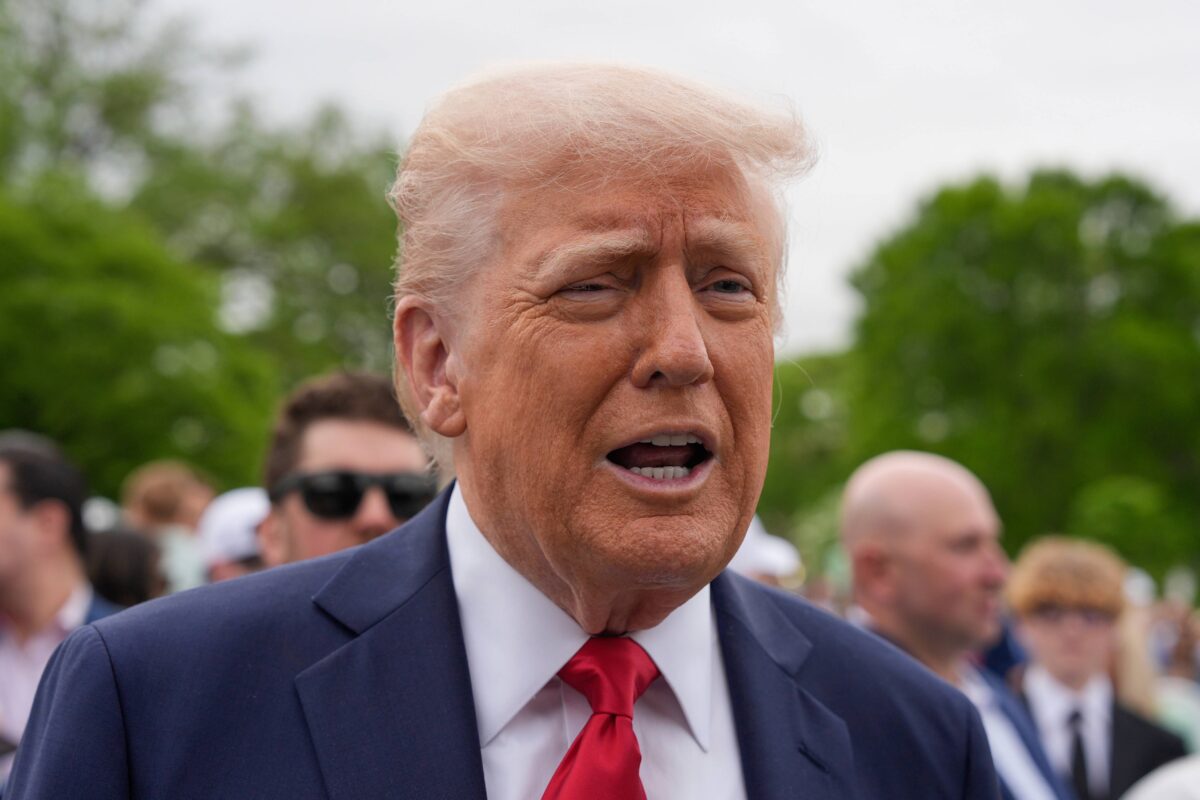Overview:
-Environmental groups brace for potential executive orders from President Donald Trump that could come on Earth Day.
-Trump administration plans to target tax-exempt status of environmental nonprofits.
-Nonprofits have protections, including the First Amendment and tax laws dating back to 1917.
By MARIANNE LAVELLE and LEE HEDGEPETH
Inside Climate News
This article originally appeared on Inside Climate News, a nonprofit, non-partisan news organization that covers climate, energy and the environment. Sign up for their newsletter here.
This article originally appeared on Inside Climate News, a nonprofit, non-partisan news organization that covers climate, energy and the environment. Sign up for their newsletter here.
Environmental groups across the country are battening down the hatches in preparation for new executive orders from President Donald Trump.
Sources in Washington, including within the Department of Justice and on Capitol Hill, have told Inside Climate News that White House officials are preparing executive orders on environmental issues. One order, they say, would target the tax exempt status of environmental nonprofits, particularly those that do legal work.
President Trump himself tipped his hand at this possibility in Oval Office comments made Thursday, after he was questioned about his administration’s plans to rescind the tax-exempt status of Harvard University.
“Tax exempt status, it’s a privilege,” Trump said. “And it’s been abused. By a lot more than Harvard, too.” After Trump added that the administration would soon be making statements that are “a big deal,” he was asked if environmental groups were among the nonprofits that are being scrutinized. “Could be,” he replied.
A number of environmental nonprofits Inside Climate News contacted declined to comment on rumors that an executive order attacking their nonprofit status was in the works. But others said that they were preparing for potential actions by the Trump administration.
“A lot of organizations in the U.S. are geared up and ready for this battle and will not back down,” said Todd Paglia, executive director of the international environmental advocacy group Stand.earth. “Really, what Trump is talking about is an intimidation strategy, because legally they have no grounds to do this and they will lose very quickly in court.”
Nonprofits: A long history, and much controversy
Stand.earth has been through a battle like this before. In 2012, Canadian Prime Minister Stephen Harper, a conservative who sought to expand the nation’s fossil fuel exports, challenged the nonprofit status of the group (then called ForestEthics) after it won several fights over pipelines and expansion of extraction in the Alberta tar sands. “I think, basically, Trump is trying to use Stephen Harper’s old playbook,” Paglia said.
But Paglia said Harper had limited success with his anti-nonprofit campaign, and in the United States, nonprofits have additional protections—not only a right to criticize the administration that is enshrined in the First Amendment to the Constitution, but a right to operate as part of civil society that is established in tax laws that date back to 1917.
Soon after establishing the federal income tax, Congress passed statues ensuring religious, charitable, scientific and educational organizations would be tax-exempt. Under this law, churches, most colleges and universities and a wide variety of other groups — including environmental organizations — do not pay taxes and their donors can deduct philanthropic gifts on their own income taxes. The purpose of the law was to increase charitable giving and expand the role of the philanthropic sector in U.S. society.
The Internal Revenue Code includes different categories of tax-exempt groups and detailed rules on what activities they are permitted to do. For example, political campaign contributions are not tax-exempt, and charitable organizations may not engage in political campaign activities and may conduct only a limited amount of lobbying.
Environmental groups often establish separate “political action” arms that do not take tax-deductible donations and work on political campaigns. But a wide variety of tax-exempt purposes are spelled out in the tax code, covering both groups that have gone to court to defend government environmental regulations and those that have sought to reduce regulations.
Political battles over the tax-exempt status of nonprofit institutions date back to the civil rights movement and have new resonance in light of Trump’s latest statements.
In 1969, Black parents in Holmes County, Mississippi, successfully sued the Treasury Department to stop several new whites-only private schools from obtaining tax-exempt status. In the wake of that decision, President Richard Nixon’s administration ordered the IRS to enact policy denying tax exemptions to any segregated schools in the United States.
One fundamentalist Christian school in South Carolina, Bob Jones University, fought the new policy, asserting that its policy to bar admission to African Americans was a matter of religious freedom. President Gerald Ford’s administration rescinded the tax-exempt status of Bob Jones University, a move that inflamed the then-nascent religious right movement. The Supreme Court in 1983 upheld the decision, saying “Government has a fundamental, overriding interest in eradicating racial discrimination in education.”
Bob Jones University later regained its tax-exempt status by ending its discriminatory policies, but the controversy had larger implications. Dartmouth historian Randall Ballmer wrote that the fight was a galvanizing moment that brought together far-right forces in the United States, launching them as a political movement that ultimately came to dominate the Republican Party.
In recent years, the political activities of nonprofit, tax-exempt conservative groups drew scrutiny, especially after the Tea Party movement’s role in spurring a Republican wave of victories in 2010. In 2013, an IRS whistleblower said the IRS had been scrutinizing the nonprofit status of groups with names with terms like “Tea Party” and “Patriots” in their names. An inspector general’s report later showed that the agency had been targeting both conservative and liberal groups for scrutiny. But soon after Trump’s first term in office began in 2017, the IRS settled a lawsuit with conservative groups and apologized for targeting them.
The Biden administration appeared mostly to steer clear of such fights. It granted nonprofit status to one politically active conservative group, the Family Research Council, despite opposition from Democratic lawmakers. But in his Oval Office remarks on Thursday, Trump described a recent White House dinner he had with unnamed “pastors, ministers and people of faith” in which a number said they had been targeted by the IRS during the Biden administration. “They’ve used the IRS for purposes of something that’s very illegal for them to do,” he said.
Trump then proceeded to talk about his administration’s own plans to scrutinize the nonprofit status of Harvard and other tax-exempt organizations.
THE LATEST FROM PLANET DETROIT
Smartphones become tool in Detroit’s flood fight: ‘Sometimes the streets are almost entirely water’
Gabriel Andersen, a 17-year-old senior at César Chávez Academy High School, earns extra money by documenting Southwest Detroit flooding using the Flood Focus app, a tool designed to tackle persistent flooding issues through community-driven data collection.
How Trump’s tariffs are set to raise Michigan grocery prices
Trump’s tariffs on imports could lead to a 2.8% increase in food prices, disproportionately impacting low-income households and complicating decision-making for food companies and farmers.
Could Trump’s executive orders endanger Michigan’s climate laws?
Federal directives look to shut down state climate laws, revive coal. Experts say the president lacks the authority to overturn state law. DTE and Consumers say they will move forward with coal plant retirements.
‘We have to protect the work’
Some sources within various nonprofit environmental groups spoke with Inside Climate News about the potential executive orders on condition of anonymity, as they’re concerned about additional targeting by the Trump administration.
The head of a grassroots Alabama nonprofit said in an interview that his organization has “sanitized” its website ahead of the suspected executive order to remove phrases like “climate resilience” that could trigger additional scrutiny from the administration. The organization has also emphasized partnerships with environmental groups in Republican strongholds they believe are less likely to be targeted than those in more liberal states.
“It makes me feel gross to do these things, but it’s just practical. We have to protect the work,” he said.
For him, in the end, it’s about ensuring that on-the-ground work helping marginalized groups can continue, regardless of the attitude of the administration.
“I’m trying not to get us caught up in something like what’s happening with sending innocent people to El Salvador. I’m not saying we’d be sent to El Salvador, but we’re through the looking glass at this point,” he said. “Anything could happen.”
A representative of a large environmental nonprofit that does legal work, including filing suits against the administration, said the organization will be ready if and when an executive order targeting their nonprofit status is released.
“We’ll be prepared,” the source said.
Warren Tidwell serves as co-executive director of the Alabama Center for Rural Organizing and Systemic Solutions, a nonprofit founded in the wake of a severe hailstorm that devastated homes in Camp Hill, a majority-Black community in east Alabama.
“We never dreamed that, with us operating at a super local level, that we would have to worry about what somebody hundreds of miles away thinks about certain words that are used or about our work.”
He said Friday that while he believes the rumored executive order will have an additional chilling effect on nonprofit work in Alabama and beyond, it’s important to remember that organizations like his have already been targeted through the withholding of grant funds.
The March 2023 hailstorm in Camp Hill left roofs across the town with gaping holes, causing additional water damage in homes that, in many cases, had already seen better days. Tidwell and others quickly began efforts to mitigate the damage, eventually securing what they believed would be game-changing funding through the Thriving Communities Grantmaking Program, which is now subject to funding freezes because of actions taken by the Trump Administration.
“The fact is that we’ve already been caught up in this thing with the freezes, and it is hurting our most vulnerable residents, repeatedly,” he said. “I have no doubt that this would definitely worsen that. We never dreamed that, with us operating at a super local level, that we would have to worry about what somebody hundreds of miles away thinks about certain words that are used or about our work.”
Trump’s expected Earth Day actions contrast starkly with those Biden announced on the holiday, which was first observed in 1970 as a way to support efforts to protect the environment.
In 2023, for example, the Biden Administration issued an executive order that focused on environmental justice, directing the government to “address inequities in environmental hazards through community engagement, interagency coordination, advancement in science, data, and research, and more.”
Now, environmental justice organizations may find themselves particularly at risk. Tax law experts have noted that Trump’s previous executive orders indicate that the administration thinks tax-exempt status should not be enjoyed by those engaged in “diversity, equity and inclusion” activities. The administration has repeatedly lumped environmental justice work into that category; in freezing federal grants and terminating a legal settlement, the Trump administration expressed the view that environmental justice action is itself illegal discrimination.
Paglia, of Stand.earth, said he does not believe Trump can succeed in challenging the nonprofit status of environmental groups or weakening their resolve to defend populations and land, air and water against the regulatory rollbacks his administration has initiated.
The new scrutiny that Trump has signalled, Paglia said, should be seen as “an endorsement” of the work that the climate, environmental and justice groups are doing.
“You don’t go after people that are having no impact,” he said.





